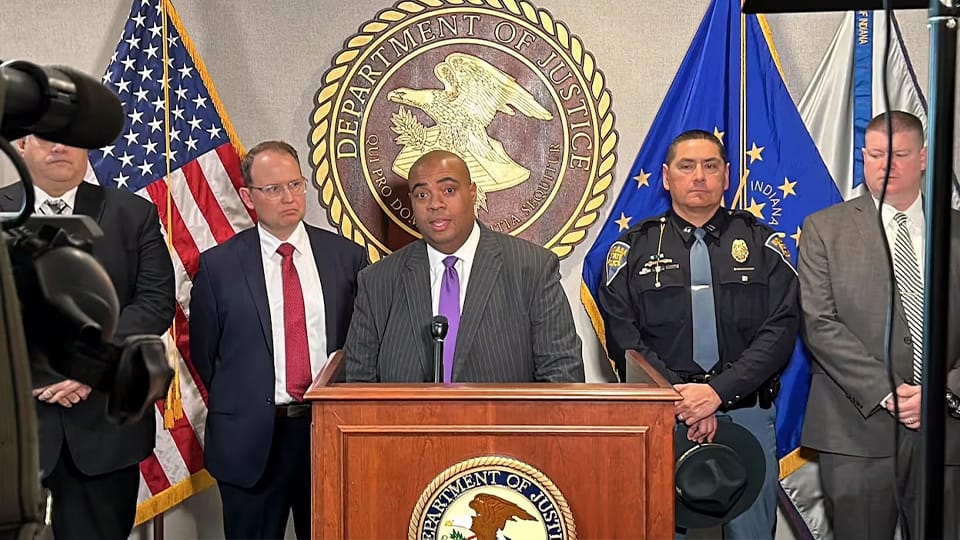Former virtual school leaders face decades in prison
Subscriber Benefit
As a subscriber you can listen to articles at work, in the car, or while you work out. Subscribe Now
The federal investigation into alleged fraud at two virtual charter schools required a complex review that included interviews of falsely enrolled students and their parents — including the family of one student who was enrolled even after their death, federal investigators said Thursday.
The former virtual charter school leaders of Indiana Virtual School (IVS) and Indiana Virtual Pathway (IVPA) could face decades in federal prison if convicted of charges that they allegedly defrauded the Indiana Department of Education, officials said.
The operators of the now-closed schools allegedly inflated the enrollment by thousands of students and accepted more than $44 million in state funding, per a federal indictment from last week.
That funding was then allegedly funneled through several for-profit companies and used for personal expenses, including tuition at Park Tudor and a purchase at a boat dealership.
The founder of the schools, Thomas Stoughton Sr., 74, of Carmel, faces one count of conspiracy to commit wire fraud, 16 counts of wire fraud, and 57 counts of money laundering. Director of IVS Phillip Holden, 62, of Middletown faces one count of conspiracy to commit wire fraud and 16 counts of wire fraud. The superintendent of both schools, Percy Clark, 81, of Carmel, faces one count of conspiracy to commit wire fraud, 16 counts of wire fraud, and 11 counts of money laundering.
Additionally, school operations manager Christopher King, 61, of Green Fork, entered a plea of guilty to conspiracy to commit wire fraud.
Attorneys for Stoughton, Holden, and Clark did not immediately return a request for comment.
“Taxpayers rightfully expect that their hard earned money is being used to educate our children as intended,” Zachary Myers, the U.S. District Attorney for Southern Indiana, said in a press conference Thursday. “Stealing public money from our educational system deprives Hoosier students of the services and opportunities that are vital to all of our futures.”
An unnamed individual described as a manager of student services representatives is also listed in the indictment as a defendant, but Myers did not comment on why they are unidentified. It’s unclear if that person is also charged in the case.
Each defendant faces between 10 and 20 years in federal prison per count, according to the U.S. Attorney’s Office for the Southern District of Indiana.
If convicted, the government could recoup that money directly or seize assets to recover the loss, officials said.
Federal indictment comes six years after Chalkbeat investigation
Chalkbeat Indiana originally investigated the school in 2017, noting ballooning enrollment, few teachers, and multiple companies affiliated with Stoughton that received funding from the school.
At the time of the investigation, state education officials said they could not intervene.
A state audit released in 2020 found the two schools inappropriately spent more than $85 million in public funding on companies connected to school officials. Of that amount, more than $68 million was improperly collected by the schools, the audit reported.
Additionally, the state attorney general sued the charter schools in 2021 to recoup $154 million in state funds. That case is still ongoing per court records.
Myers said the state and federal lawsuits are two different actions working under different laws and periods of time, which may lead to the discrepancy in damages.
In a statement, a spokesperson for the Office of Attorney General Todd Rokita said the office will continue its civil lawsuit to recoup damages.
“While we are pleased to see that there will be potential criminal repercussions for at least some of those involved in the diversion of public funds, the criminal charges do not encompass all of the loss or involved parties,” the spokesperson said.
Herb Stapleton, special agent in charge of the Indianapolis FBI field office, said the case was a complex one involving reviews of hundreds of bank accounts and interviews with falsely enrolled students or their parents.
“In this particular case it was the State Board of Accounts of Indiana who put a significant amount of effort into identifying that there was potential fraud here, and then did the right thing by referring it to law enforcement,” he said.
A trial for Stoughton, Holden and Clark has not been scheduled.
Indictment spurs calls for stronger charter oversight
The indictment has spurred charter opponents to call for stronger oversight in a state with a legislature that fully embraces all forms of school choice.
“Instead of depending upon elected school officials, the state has decided to depend on charter schools that use outside contractors who are not under close supervision and lack public accountability,” Democratic State Rep. Ed DeLaney, who represents Indianapolis, said in a statement on Tuesday. “We export our management and oversight responsibilities to people who choose not to perform the function. In the end, the taxpayers lose out.”
The indictment also raises questions about whether charter school authorizers, which are responsible for overseeing charter schools in lieu of a publicly elected school board, are adequately monitoring their portfolio of schools.
“Charter school authorizers do not always monitor the conduct of the schools they are authorizing,” DeLaney said. “Our current charter school management system, or lack thereof, not only creates the opportunity for fraud but has reportedly cost the state at least $85 million of taxpayer money in this one case.”
